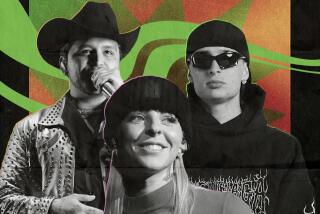Devendra Banhart in tune with Gilberto Gil
Gilberto Gil has released more than 50 albums in his career -- the latest is “Banda Larga Cordel,” which came out this month. That puts him about 45 ahead of Devendra Banhart, but the Brazilian musical icon, 65, and the Los Angeles-based folk-rock eccentric share a passion for eradicating distinctions among musical genres, as they’ll demonstrate when they play at the Hollywood Bowl on Sunday as part of the KCRW World Festival series.
Gil, who also has served as Brazil’s minister of culture since 2003, made a crusade of eclecticism when he spearheaded the Tropicalia movement in the 1960s, and his intoxicating example resonates in the free-spirited approach of Banhart. The 27-year-old son of an American father and a Venezuelan mother might come off as an innocent, but in a conference call with Gil he showed that he’s a serious student of his hero, and of South American music overall.
Devendra, can you tell us how Gilberto has influenced and inspired you?
Banhart: When I think of Gil, it’s so generous, his music. When one person can make music that turns you on to a plethora of genres and cultures, that’s education, man; that’s what opens your mind. It’s one-stop shopping in this weird way too, where you don’t have to go to a bunch of different records. On one record you traverse the globe.
Gil: It’s been like that since childhood. I’ve been always interested in different approaches to music coming from different cultures. It’s been a natural thing. We Brazilians are very diverse from the very beginning. Not just me. Maybe I expose it a little more obviously than other musicians, but it’s natural in Brazil, influences from all over, from European culture, from African culture, from American culture.
Devendra, you spent much of your childhood in Venezuela -- what’s the cultural relationship between that country and Brazil?
Banhart: It’s two incredibly different things. In Venezuela we think of Brazil as another world.
Gil: But at the same time, I think all the South American countries relating to the Caribbean area, they’ve been very influential on Brazilian music. The different styles -- the cumbia, the mambos, the rumbas, the cha-cha-cha -- all those passed from the Caribbean islands and [on to] Venezuela and Ecuador, and even Peru and Colombia. It’s in our musical DNA.
Devendra, you’ve recorded many songs in Spanish -- do you draw from a wide range of Latin styles?
Banhart: Yeah, it’s like, OK, the United States has Bob Dylan. . . . But when you go to Brazil, OK, there’s Gilberto Gil and there’s Caetano Veloso; these are the Bob Dylans, right? And then you go to Argentina and let’s say it’s Atahualpa Yupanqui. You go to Chile, its Victor Jara or Violeta Parra. . . . Each one of them is filtering their culture through themselves, but they’re still individuals, so that’s how you see a light amongst lights. I think the influence is that.
And also it’s great being alive at a time when -- and Gilberto’s one of the first people that got into the idea -- of using the Internet as a tool for sharing music.
Gil: I’m not the first one, but in Brazil we’ve been struggling for more openness with the whole digital culture, so it’s open to as many people as it can have. In a sense we need to politicize the whole question about the new technologies so that society can really participate and have an opinion and have a role in the policy-making processes. I’m seen as kind of a pioneer in Brazil, but I’m contemporary with so many people in the States and Europe and Africa and everywhere.
Banhart: Why I brought this up is because it’s exactly what Gil said. It’s about participation . . . . Therefore it takes less laziness, it takes searching, it takes some effort on your part to find music, but it’s such a slight effort and you have the world at your fingertips. It’s taking advantage of being alive right now by not limiting yourself to one style of music.
Gilberto, you were exiled by the military government and lived in London for a few years. What impact did that have on your music?
Gil: A very strong one. London was a very big scene then. I was there from ’69 to ’72. I arrived in London the day the Rolling Stones gave the concert at Hyde Park, and I was able to mingle with different people, from the Moody Blues and from Pink Floyd. Terry Reid, an American musician that was living there, he became a very close friend. The Incredible String Band members used to come to our place three days a week and play and talk and discuss.
Did you know that Mike Heron from the Incredible String Band is also on the Hollywood Bowl show? He’s playing with the opening band, the Album Leaf.
Gil: No. Fantastic. Brazil and States and England. Good.
Banhart: I’ve got to say, though, could we please mention how amazing Gilberto’s record that he made in London is?
Gil: It’s just me and bass and drums, very simple. It was full of enthusiasm and life. I was struggling to keep myself collected, being expelled and everything. So I was trying to digest everything that I could digest. So the album sounds like that. That freshness, that eagerness for life.
Banhart: But let me ask, Gilberto, are you going to be playing mostly new stuff from the new record, or some old stuff, or a mix?
Gil: Some old stuff too, and some versions that I do of different songs, like George Harrison’s “Something,” with a soft reggae beat. I’m going to play “Girl From Ipanema,” also with a soft reggae beat. And then seven songs from the new album and hits from the past.
Devendra, what kind of show are you going to do?
Banhart: Well, we’re going to do what we always do, which is not practice till a couple of hours before, write the set list as we go along. We’re very lazy and we really don’t know what we’re doing, and so we’re not going to change that for the Hollywood Bowl.
richard.cromelin @latimes.com
More to Read
The biggest entertainment stories
Get our big stories about Hollywood, film, television, music, arts, culture and more right in your inbox as soon as they publish.
You may occasionally receive promotional content from the Los Angeles Times.






